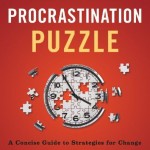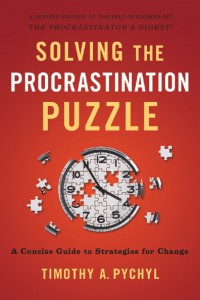 Defeating Procrastination is a process. There is no magic pill or easy fix. But it can be done.
Defeating Procrastination is a process. There is no magic pill or easy fix. But it can be done.
We’re on it.
 Scaffolding students out of procrastination: teacher interview with Mike Cahir
Scaffolding students out of procrastination: teacher interview with Mike CahirStudent Success Podcast No. 16
Feb. 10, 2014, recorded Feb 8, 2014
Today’s Guest: Mike Cahir, Teacher and Department Chair, English Department, Archbishop Carroll High School, Washington, DC
In this interview, Mike rejoins us to discuss procrastination from the point of view of a high school teacher. I ask him about his take on procrastination, and then I review some of the ideas that we are learning from Dr. Pychyl of the Procrastination Research Group at Carleton University. Mike processes this new information through delivers his own experiences and offers ideas and advice for both students and teachers. Continue reading
 Third quarter is break-down time
Third quarter is break-down timeIt just is. Lost in the middle of a long year, things get tough. You just got through midterms and the end of the 2nd quarter, you had a nice winter break, then, bam! School is back, and hard.
In Q3 teachers are off their game, too. They’re either panicked for having gotten off track from their pacing and lesson plans, overwhelmed from grading and making new plans, or distressed that students aren’t where they should be. Worse, administrators are having their own panic and are throwing meetings and putting more demands on teachers, worsening the load for everyone. Continue reading
 Procrastination: Interview with high school students and Dr. Timothy A. Pychyl
Procrastination: Interview with high school students and Dr. Timothy A. PychylStudent Success Podcast No. 15
Jan. 30, 2014, recorded Jan 28, 2014
Today’s Guest: Timothy A. Pychyl, Ph.D., and Sean, Sena, and Matthew, high school students
Dr. Pychyl, whom we agree to call Tim now, discusses the personal experiences with and possible solutions for three high school students, Sean, Sena, and Matthew. These students bravely discuss their struggles with workflow problems and strategies they could use to overcome it.
In this interview, Tim shows his deep compassion for students and concern for their success. The students engage his ideas thoughtfully, and we look forward to hearing back from them soon on how they are progressing.
Please see more from Dr. Pychyl at the Resources links below. Continue reading
 Real solutions for procrastination from Dr. Timothy A. Pychyl, part 2
Real solutions for procrastination from Dr. Timothy A. Pychyl, part 2Student Success Podcast No. 14, Jan. 22, 2014, recorded Jan 15, 2014
Today’s Guest: Timothy A. Pychyl, Ph.D.
Dr. Pychyl shares his incredible knowledge, experience, research, and insight into the nature of procrastination and how to overcome it. Dedicated to bettering people’s lives, he uniquely applies academic concepts in a way we can all understand and appreciate.
This is part 2 of 2 segments we are publishing on the Student Success Podcast. Tim has also published his own version of the interview on his “iProcrastinate” podcast. Continue reading
 Real solutions for Procrastination from Dr. Timothy A. Pychyl, part 1
Real solutions for Procrastination from Dr. Timothy A. Pychyl, part 1Student Success Podcast No. 13, Jan. 15, 2014
Today’s Guest: Timothy A. Pychyl, Ph.D.
Dr. Pychyl shares his incredible knowledge, experience, research, and insight into the nature of procrastination and how to overcome it. Dedicated to bettering people’s lives, he uniquely applies academic concepts in a way we can all understand and appreciate.
This is part 1 of 2 segments we are publishing on the Student Success Podcast. Tim has also published his own version of the interview on his “iProcrastinate” podcast. Continue reading
 Why are we teaching kids to use 1970s technology?
Why are we teaching kids to use 1970s technology?Ever hear of Day Timer? Yes, the personal agenda book still exists, but only for a few old school types. Except in schools, where the kids are supposed to use agenda books, and it’s all their damned fault if they don’t.
Seriously. At the A+ Club, we hear from teachers all the time that Johnny “just needs to do what all the other students do and write down the assignments in his agenda book.”
If it were up to me, every kid would have exchange email and Outlook working seamlessly on their computers, tablets, and phones, and everything they need to do would be posted there automatically. Continue reading
![urgent_msclipart_C900434758[1]](http://school4schools.com/blog/wp-content/uploads/2014/01/urgent_msclipart_C9004347581-150x150.png) Is it urgent enough yet?
Is it urgent enough yet?A student of ours mentioned that he couldn’t bring himself to getting some work done over the break, but the night before classes start again, he finally “got the urge” to finish it.
This got me thinking about that word, “urgent.” I never before associated it with an “urge,” which we normally think of as being a kind of desire, as opposed to something of necessity, or of immediate concern, you know, an “urgency.” Continue reading
 Procrastinators are motivated by deadlines.
Procrastinators are motivated by deadlines.Clarity and purpose, hard to find and easy to dismiss, now assemble at the last minute. Focus arrives, hard work ensues, and the job gets done.
That urgency at the last minute invigorates and inspires procrastinators. It’s almost exhilarating — and it is, because you’re getting the same brain-chemical reactions from “procrastinator’s panic” as you do from getting startled. Scientists call it ” CRF,” and it is a brain drug that is released at the panic of a deadline.
So what’s the problem? Well… every procrastinator knows it: you should have gotten that feeling of urgency a little sooner. Sometimes “last minute” means by the deadline. All too often, it’s after the deadline passed and turned into a “drop dead deadline.” But you got it done, so what’s the problem? Continue reading
 Bribery?
Bribery?Maybe, but flattery will work better. Seriously.
The highest and most effective form of teacher flattery is asking a teacher for help. The next highest is actually doing your work. You meet teacher expectations, you get an A. Easy enough.
Well, let’s start from there, anyway. So what do teachers really want? And how can the student figure that out? Continue reading